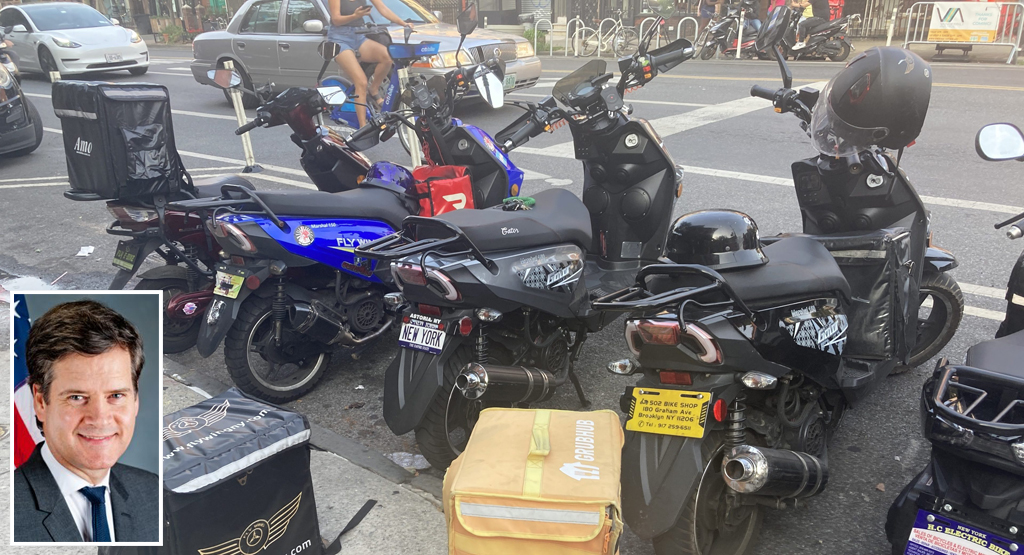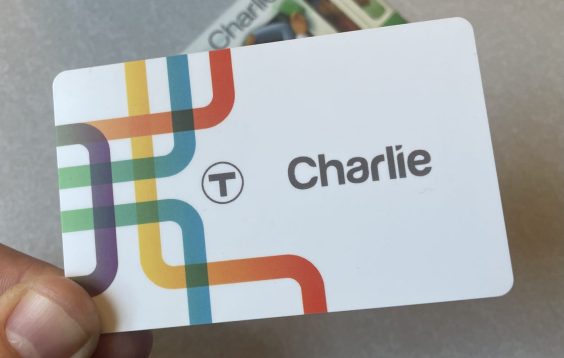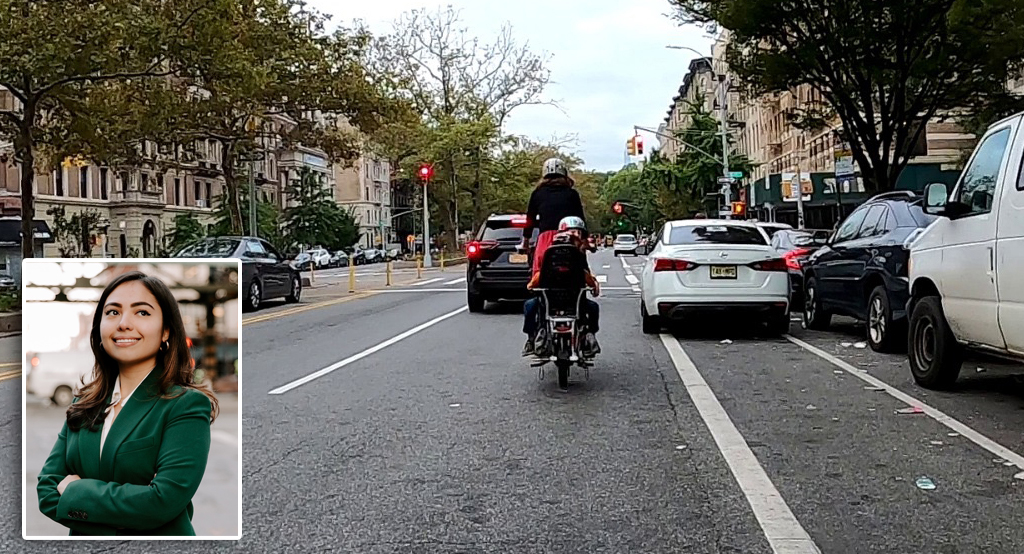It's a loophole so big you could drive a, well, moped through it.
New legislation in Albany seeks to eliminate — in one fell swoop — the use of illegal mopeds by requiring sellers of the devices to register them with the DMV before buyers could take them out of the shop.
Currently, all motorized vehicles with proper vehicle identification numbers — including mopeds, cars, and trucks — must be registered before they can be legally driven, but the sellers of the vehicles are not required to register them, according to a DMV spokesperson, though reputable dealers do so as an added service.
Now state Sen. Brad Hoylman-Sigal (D-Manhattan) wants to close that loophole — and, he hopes, the proliferation of mopeds, which are heavier and faster than traditional e-bikes.
"As the number of mopeds has exploded on our city streets, we need to ensure that all riders have their vehicles registered, as already required by state law,” the pol said. “This common-sense bill would simply ensure that the registration happens at the point of sale, before someone rides out of the shop. I hope this fix will reduce the burden on riders while also holding bad actors accountable.”
NEW: Just intro’d legislation to require all mopeds be registered at point of sale. 🏍️
— Senator Brad Hoylman-Sigal (@bradhoylman) October 13, 2023
Current loophole allows these motor vehicles to go unregistered when bought.
Let’s close the loophole and lessen the burden on riders by making sure registration happens before they ride…
The key to the current problem with mopeds is that some are legal and others are not; the legal ones are equipped with the 17-character VIN, which allows law-abiding moped owners to get a license plate issued by the DMV.
A moped without a VIN can never be legal because it cannot be registered, and, as a result of that and that many mopeds with VINs aren't registered, the vast majority of mopeds are not legal. And many delivery workers don’t even realize they are using an illegal device because brick-and-mortar storefronts or online retailers don't tell them the rules regarding registration.
“You have stores that know these vehicles are illegal … and they tell people, often immigrants, ‘Yeah, this is street legal, take it out,’” said freshman Assembly Member Alex Bores (D-Upper East Side) during an E-Vehicle Safety Alliance meeting over the summer. “We need to cut off the flow of these vehicles before they get onto these streets.”
Where some moped opponents have called for more enforcement, Hoylman-Sigal’s bill seeks a different approach. Instead of heavy-handed enforcement of individuals, he hopes to make sure the vehicles are legal and trackable before they leave the store.
Advocates for delivery workers are supportive of the legislation, saying that misinformation about moped rules is contributing to the influx of illegal vehicles.
“We strongly believe that is the responsibility of manufacturers to make sure that when they are selling these micro-mobility devices they're selling them responsibly," said Ligia Guallpa, the executive director of the Worker’s Justice Project, which organized Los Deliveristas Unidos in 2020. "Consumers buy what's available on the market. And when they’re not informed what kind of documentation is needed, it can create issues such as what we’re seeing right now: a great number of motor scooters not being registered, motor scooters that shouldn't even be on our streets."
Hoylman-Sigal's bill, which is light on details, assigns a lot of the legwork to the Department of Motor Vehicles, which can currently impose civil penalties against unregistered dealers (a vast portion of moped dealers are unregistered because their merchandise itself is illegal). A spokesperson said the agency works with law enforcement to conduct investigations against unregistered dealers of both cars and mopeds, but the agency did not provide numbers. (The agency declined to comment on pending legislation.)
Attorney Daniel Flanzig, who specializes in bike law, told Streetsblog he believes the proposed legislation could help make streets safer, including for those on mopeds themselves, by getting all of the other illegal, and improperly manufactured, devices off the road.
“What they're trying to control are these in-between things that don’t fit into the area of motorcycle or e-bike. The one thing that's necessary in order to register vehicles is a VIN number. A lot of things being sold to delivery workers are quasi-motorcycles that don't have VIN numbers,” said Flanzig. “Eliminating all those other in-between vehicles that we can't really define or register, I think it's a good way to try to get it cleaned up.”
Since mid-September, when the Department of Consumer and Worker Protection kicked off its enforcement of a local law that prohibits the sale of uncertified batteries, it also started cracking down on illegal mopeds. The agency quickly issued violations to 69 businesses for battery noncompliance, issued cease-and-desist letters to 34 online retailers — including Amazon — and slapped 23 businesses with separate violations for selling illegal mopeds. And according to the NYPD, cops seized 8,607 mopeds between Jan. 1 and mid-September, more than double the 4,085 seized during the same period last year.






